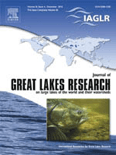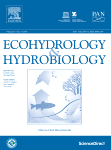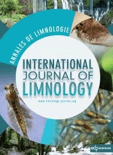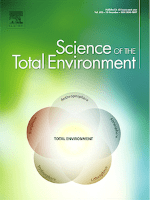
JOURNAL OF GREAT LAKES RESEARCH
Scope & Guideline
Empowering Ecological Insights for Tomorrow
Introduction
Aims and Scopes
- Ecosystem Dynamics and Biodiversity:
Research exploring the complex dynamics of aquatic ecosystems, including species interactions, food web structures, and biodiversity assessments, particularly focusing on native and invasive species in the Great Lakes. - Water Quality and Pollution:
Studies on various pollutants, including nutrients, heavy metals, and microplastics, and their impacts on water quality, aquatic life, and human health in the Great Lakes region. - Climate Change Impacts:
Investigations into how climate change is affecting hydrology, temperature regimes, and ecological responses in lake ecosystems, with a particular focus on adaptive management strategies. - Fisheries Management and Conservation:
Research aimed at understanding fish population dynamics, habitat requirements, and the effects of anthropogenic pressures on fish communities, with a focus on sustainable management practices. - Indigenous Knowledge and Community Engagement:
Studies that integrate Indigenous perspectives and community involvement in the management and conservation of aquatic resources, emphasizing collaborative approaches. - Hydrological Modeling and Management:
Research involving hydrodynamic modeling, nutrient cycling, and watershed management to understand and mitigate the impacts of land use on lake ecosystems.
Trending and Emerging
- Microplastic Pollution and Its Ecological Effects:
Research on microplastics has surged, focusing on their sources, distribution, and impacts on aquatic life, reflecting increasing public and scientific concern about plastic pollution. - Climate Change Adaptation Strategies:
Emerging studies are increasingly addressing climate change mitigation and adaptation strategies, emphasizing the need for resilience in Great Lakes ecosystems amidst changing environmental conditions. - Integration of Indigenous Knowledge Systems:
There is a growing emphasis on integrating Indigenous knowledge and community-based approaches into research and management practices, highlighting the importance of cultural perspectives in environmental stewardship. - Socioeconomic Impacts of Environmental Changes:
Research is increasingly focusing on the socioeconomic consequences of ecological changes, such as harmful algal blooms and fish population dynamics, particularly in local communities dependent on these resources. - Technological Innovations in Monitoring and Management:
Advancements in remote sensing, machine learning, and other technologies are being applied to enhance monitoring, modeling, and management of lake ecosystems, indicating a trend toward data-driven decision-making.
Declining or Waning
- Historical and Paleolimnological Studies:
Research focusing on historical ecological changes and paleoenvironmental reconstructions has seen a decline as contemporary issues and immediate environmental challenges gain priority. - Remote Sensing Applications in Non-Contemporary Contexts:
While remote sensing remains important, applications focused on historical data analysis rather than real-time monitoring or current ecological assessments appear to be less prevalent. - Traditional Water Governance Models:
Studies examining conventional water governance frameworks are diminishing as there is a growing shift towards more integrated and adaptive management approaches that involve multiple stakeholders. - In-depth Studies on Specific Invasive Species:
There is a noticeable reduction in papers focusing solely on individual invasive species, as researchers increasingly adopt broader ecological perspectives that consider multiple stressors and interactions.
Similar Journals

Inland Water Biology
Connecting Research with Freshwater ConservationInland Water Biology is a distinguished peer-reviewed journal published by MAIK NAUKA/INTERPERIODICA/SPRINGER, focusing on the intricate interactions within freshwater ecosystems. With its ISSN (1995-0829) and E-ISSN (1995-0837), this journal has established itself as an essential resource for researchers and professionals in the fields of Aquatic Science and Ecology, evidenced by its consistent ranking in the Q3 category for both disciplines in 2023. Covering a wide array of topics related to the biology of inland waters, the journal aims to disseminate cutting-edge research findings and theoretical advancements that contribute to the understanding of aquatic environments and their ecological significance. Although it does not offer open access, its impact in the academic community is noteworthy, ensuring that published works undergo rigorous peer review. Researchers, professionals, and students alike will find valuable insights and innovative approaches within its pages, making Inland Water Biology a vital addition to their academic endeavors.

BOLETIM DO INSTITUTO DE PESCA
Connecting researchers for impactful aquatic discoveries.BOLETIM DO INSTITUTO DE PESCA, published by the Instituto Pesca, is a Brazilian journal dedicated to advancing the fields of Animal Science and Aquatic Science. With its Open Access policy adopted in 2008, the journal ensures that research is widely disseminated, fostering collaboration and innovation among researchers, professionals, and students alike. Despite its recent Q4 category rankings in the 2023 metrics for both disciplines, the journal plays a vital role in providing a platform for emerging studies and critical discussions related to aquatic ecosystems and fisheries management. Covering a wide range of topics within its scope, BOLETIM DO INSTITUTO DE PESCA publishes original research, reviews, and case studies, stimulating academic dialogue and contributing to the sustainable management of aquatic resources in Brazil and beyond. This journal is an essential resource for anyone invested in marine and freshwater biology, ecology, and conservation.

CANADIAN JOURNAL OF FISHERIES AND AQUATIC SCIENCES
Fostering collaboration for thriving aquatic environments.The Canadian Journal of Fisheries and Aquatic Sciences, published by Canadian Science Publishing, stands as a premier interdisciplinary journal dedicated to advancing knowledge in the fields of aquatic sciences, ecology, and evolutionary biology. With a longstanding history of publication since 1980, this journal delivers high-quality, peer-reviewed research that contributes to the understanding of aquatic ecosystems and the sustainable management of fisheries. The journal is esteemed for its rigorous standards and currently holds a Q1 ranking in both Aquatic Science and Ecology, Evolution, Behavior, and Systematics as of 2023, evidencing its significant impact in these critical areas. Researchers, professionals, and students alike can expect compelling explorations of both fundamental and applied aspects of aquatic sciences. While the journal offers traditional access, it remains committed to disseminating pivotal research findings to foster a vibrant community of scholars and practitioners striving towards innovative solutions for aquatic environmental challenges.

LIMNETICA
Connecting researchers to the pulse of aquatic science.LIMNETICA is a prestigious academic journal dedicated to advancing the field of Aquatic Science, Ecology, and Water Science and Technology. Published by the Asociación Española de Limnología in Spain, this journal serves as a vital platform for researchers and professionals seeking to share their findings and insights from 1996 to 2024. With a commendable Q2 ranking in Ecology and notable Q3 rankings in Aquatic Science and Water Science and Technology, LIMNETICA emphasizes high-quality, peer-reviewed research that contributes to our understanding of freshwater ecosystems. Although currently not classified under Open Access, its rigorous indexing and Scopus rankings—positioning it in the top 64th percentile for Environmental Science—illustrate its impact in the scientific community. Researchers, students, and professionals are encouraged to engage with LIMNETICA to stay abreast of key developments and foster collaborative efforts in aquatic research.

ECOHYDROLOGY & HYDROBIOLOGY
Delving into the dynamics of water and ecosystems.ECOHYDROLOGY & HYDROBIOLOGY, published by the European Regional Centre Ecohydrology Polish Academy of Sciences, is a leading journal in the field of Aquatic Sciences, recognized for its impactful contributions with a 2023 Scopus ranking placing it in the top 20% of its category. Established in 2001 and converging scholarly insight until 2024, this journal aims to advance knowledge on the interactions between hydrological cycles and biological communities, providing a platform for innovative research that addresses critical environmental challenges. With a Q1 quartile classification, it is an essential resource for researchers, professionals, and students dedicated to exploring sustainable aquatic ecosystems. Although it follows a traditional subscription model, the journal maintains a commitment to disseminating high-quality research that informs policy and practice in the field. Located in Portugal and operating out of Lodz, the journal invites a diverse global readership to engage with its comprehensive range of articles and studies.

ANNALES DE LIMNOLOGIE-INTERNATIONAL JOURNAL OF LIMNOLOGY
Connecting Scholars to Freshwater InsightsANNALES DE LIMNOLOGIE-INTERNATIONAL JOURNAL OF LIMNOLOGY is a distinguished scientific journal dedicated to the field of limnology, focusing on freshwater ecosystems and their ecological dynamics. Published by EDP SCIENCES S A, this journal has been a vital resource for researchers and professionals since 1965, fostering a deep understanding of aquatic environments through quality research and scholarly discussions. The journal was indexed in Scopus, where it ranked in the 37th percentile within the Agricultural and Biological Sciences category, emphasizing its contribution to aquatic science. While its coverage has been discontinued in Scopus since 2021, the journal continues to engage its readership with critical insights and reviews in limnology. ANNALES DE LIMNOLOGIE promotes open access to facilitate the dissemination of valuable knowledge, making it an essential platform for students, researchers, and professionals who strive to advance our understanding of freshwater systems.

Inland Waters
Advancing Sustainable Solutions for Inland WatersInland Waters, published by TAYLOR & FRANCIS LTD, stands as a prestigious scholarly journal dedicated to the critical examination of freshwater ecosystems and their management. With an ISSN of 2044-2041 and an E-ISSN of 2044-205X, this journal boasts a remarkable Q1 ranking in both Aquatic Science and Water Science and Technology for 2023, reflecting its significant impact in the field. Researchers and professionals can benefit from its comprehensive coverage of cutting-edge research, methodological advancements, and policy implications concerning inland waters. Committed to disseminating valuable knowledge in a vital area of environmental science, Inland Waters aims to foster collaboration and promote innovative solutions for sustainable water management practices. As it continues through its converged years from 2012 to 2024, the journal remains an essential resource for those dedicated to advancing our understanding and stewardship of freshwater environments worldwide.

Water Biology and Security
Exploring the depths of water science and security.Water Biology and Security, published by KEAI PUBLISHING LTD, is a pivotal open-access journal that has been addressing critical issues in the interdisciplinary fields of water sciences, aquatic biology, and environmental sustainability since its inception in 2022. With an E-ISSN of 2772-7351 and a distinguished ranking within the top quartile (Q1) of several categories including Agricultural and Biological Sciences, Animal Science and Zoology, Aquatic Science, and Water Science and Technology, the journal stands out as a leading platform for innovative research. Based in Beijing, China, and supported by an impressive impact factor derived from its Scopus rankings, the journal aims to disseminate high-quality and impactful research that addresses the challenges related to water resources and ecosystems. Its open-access format enhances accessibility, ensuring that vital information reaches policymakers, practitioners, and scholars worldwide. As we converge through 2024, the journal aspires to foster a vibrant scholarly community, facilitating dialogues that inform practice and advance the scientific understanding of aquatic environments.

Journal of Oceanology and Limnology
Fostering Dialogue on Aquatic SustainabilityJournal of Oceanology and Limnology, published by SCIENCE PRESS, is a premier academic journal dedicated to advancing the fields of oceanography and limnology. With an ISSN of 2096-5508 and E-ISSN 2523-3521, this journal has emerged as a vital resource since its inception, aiming to disseminate cutting-edge research and comprehensive studies on aquatic environments. Based in China and indexed with notable rankings in Scopus, including a Q2 category in Oceanography and a Q3 category in Water Science and Technology, this journal significantly contributes to knowledge in these crucial scientific disciplines. The H-index for the journal is currently being established, reflecting its evolving impact within the academic community. Moreover, the open access model promotes wider dissemination, ensuring that research findings are accessible to a global audience. Covering a diverse range of topics from ecosystem health to climate impact on water bodies, the Journal of Oceanology and Limnology aspires to foster interdisciplinary dialogue and innovation among researchers, professionals, and students engaged in understanding and preserving aquatic life.

Science of The Total Environment
Leading the Way in Environmental Research ExcellenceScience of The Total Environment, an esteemed journal published by Elsevier, holds a significant position in the field of environmental science, encompassing critical areas such as Environmental Chemistry, Environmental Engineering, Pollution, and Waste Management and Disposal. With an impressive impact factor and ranked in the Q1 quartile across its categories for 2023, the journal is recognized for its high-quality research output and contribution to environmental sustainability. Operating from its base in the Netherlands, the journal has been a valuable resource since its inception in 1972, welcoming innovative studies that address complex environmental challenges. Its notable rankings—such as Rank #9 in both Environmental Sciences and Pollution—underscore its relevance and influence in the academic community. Although the journal currently does not provide an open access option, the robust findings and discussions presented within its pages continue to foster a deeper understanding of environmental issues. Science of The Total Environment is an essential platform for researchers, professionals, and students dedicated to advancing knowledge and solutions in the rapidly evolving field of environmental science.